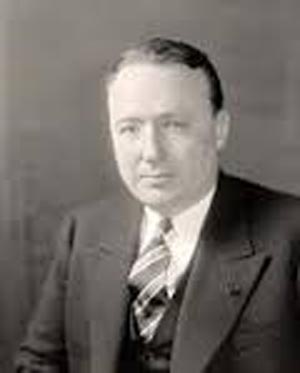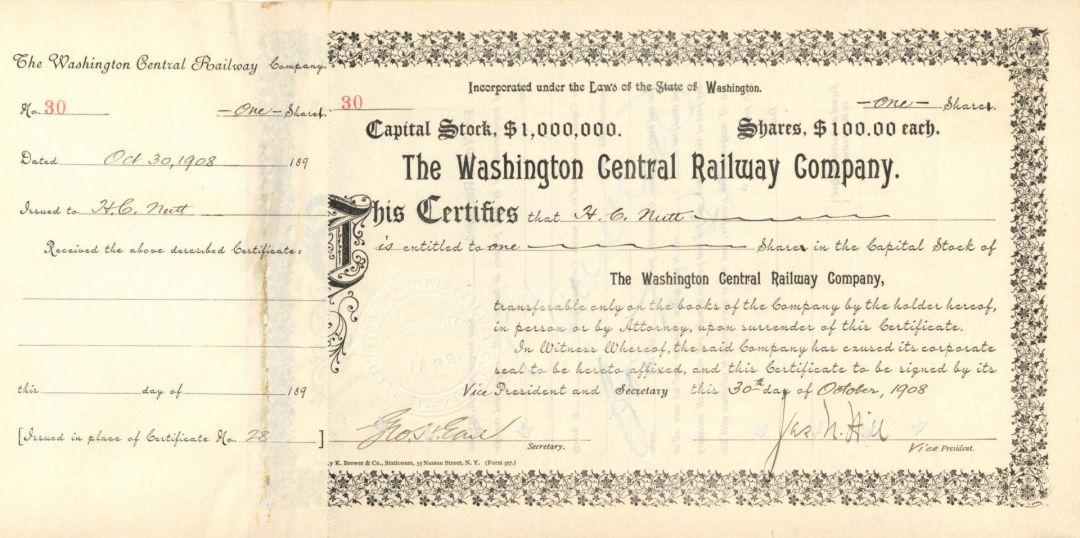Washington Central Railway Co. Signed by James N. Hill and Geo. H. Earl - 1908 dated Autographed Stock Certificate
Inv# AG1933B AutographStock signed by James N. Hill as vice president and Geo. H. Earl as secretary. Revenue stamp on back.
James Norman Hill (1843-1910) was the eldest son of James J. Hill, and like his father, was a railroad man. He was born in St. Paul, Minnesota. He was the third child of ten. Hill graduated from Yale in 1893, and began his business career as a clerk in a railroad office. He held various subordinate positions, but in 1905 was made vice president of the Northern Pacific Railroad Company. He was also the vice president of the Minnesota & International Railroad, a director of the Burlington and Erie Railroads, of the Northern Securities Company, Pacific Coast Company, a Vice President of the Northern Express Company, and a Trustee of the New York Trust Company and the Washington and Columbia Trust Company. James N. Hill also moved to Texas and is noted to have earned millions investing in the Texas Oil Company.

George Howard Earle Sr. (1823-1907) Mr. Earle was of old New England Quaker stock, and he was the seventh in descent from Captain Ralph Earle, of Portsmouth, R. I. His parents were Thomas Earle and Mary Hussey, and they came to this city from Massachusetts immediately after their marriage. The son was born here on December 8, 1823.
George H. Earle received most of his education in the schools of this city. He attended a private school in Massachusetts for one year. In accordance with the practice obtaining among the Friends at that time, he was apprenticed to Matthias Baldwin, founder of the locomotive works, and served for a time in his shop.
When he reached the legal age, he decided to study law. After his admission to the Bar he spent the year 1848 in a pedestrian tour through Europe. It was an eventful journey. Owing to the political disturbances which were agitating Europe at that time, he was frequently suspected of being a spy. In Vienna, Rome, Naples, Munich and Paris he saw conflicts in the streets between citizens and soldiers. In Paris he narrowly escaped being killed.
After the year of travel he returned to this city and opened a law office in partnership with Richard P. White, his brother-in-law. Thomas Earle died the same year, and the son fell heir to his father's large practice. About that time he married Ellen Frances von Lohr, the wedding taking place on April 5, 1849.
For nearly fifty years the law firm of Earle & White enjoyed a lucrative and an extensive practice. George H. Earle soon began to assert himself as a champion of the slave and also as a municipal reformer. As a boy he had taken part in an anti-slavery demonstration, and he was wounded at the riot attending the burning of Pennsylvania Hall.
He defended many slaves captured under the provisions of the Fugitive Slave law, and on more than one occasion obtained the release of his clients. He was a delegate to the first Republican National Convention, in 1856, which nominated John C. Fremont for the Presidency. Until his death he was the oldest living delegate to that convention. He took the stump and took part in the campaigns which preceded the election of Lincoln and Grant.
After the Civil War he turned his attention to municipal affairs. As a result of the political abuses of that day the debt of the city was almost $70,000,000. He led in the movement to have the city's affairs conducted on a business basis, and he was one of the organizers of the taxpayers' association for municipal reform, of which Henry C. Lea was chairman. This association was succeeded by the Committee of One Hundred. Mr. Earle took an equally active part in the work of the committee, and as chairman of the Committee on Public Meetings he arranged all the notable gatherings. At these meetings Mr. Earle was himself a speaker. His manner was simple yet powerful, and when he desired to be, he was deliciously satirical. He kept up the fight for municipal regeneration until the adoption of the Bullitt Bill, and since that time he had kept in close touch with public affairs, although not being an active participant.
The noted Abolitionist was an intimate friend of Abraham Lincoln. In fact, there were few great men in the country's history for the past fifty years with whom he did not have close acquaintance."











Ebay ID: labarre_galleries